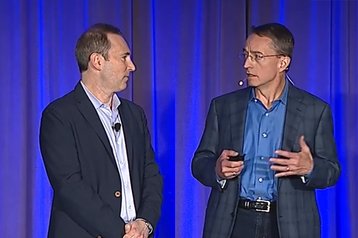This week at AWS re:Invent, Amazon Web Services (AWS) did something that we kind of knew it would have to do: it announced a version of its hardware designed to run on-premises.
It also did something we never would have guessed it would do: it's offering to run VMware in your data center.
Battle over?
The war between AWS and VMware used to be a battle of ideologies. VMware had made its name virtualizing IT resources in the enterprise market, so IT managers could build and run efficient shops. Amazon wanted you to stop doing all that, and just rent resources in its data centers.
For a long while, it looked like a stalemate. There were some things which would always be done in-house (and VMware had a more and more powerful position there), and there were others that everyone was advised to ship off to the public cloud post haste (where AWS has a colossal market share).
The industry response was to come up with a concept called 'the hybrid cloud' which would somehow stitch those elements together into a single, sensible IT resource. Hybrid cloud became a term brandished by on-prem providers who wanted to emphasize their ongoing role, and companies trying to do public cloud that wanted a USP to challenge AWS (so far, they all failed).
Then, something unusual happened. VMware has a cloud version of its products - and yes, it did also have a failed public cloud business it sold to OVH. All of a sudden towards the end of 2016, AWS announced it would support VMware's software stack on its own public cloud. At the time, we commented that this was the beginning of the end for in-house IT. Suddenly VMware customers had a feasible route to get their stuff into the cloud, and AWS had a sensible option for those who insisted they still needed some in-house capacity.
This week's announcement has pushed that much further. AWS, which once argued that everything should go into the public cloud, is now offering Outposts - a way to run its cloud on your own premises. Anyone who has watched the public cloud market shouldn't be too surprised by this. Microsoft, AWS' closest (but still distant) rival had done this with Azure Stack, its own on-premises hardware offering, way back in 2017.
Google and Alibaba also offer their own hardware. So yes, it makes sense for AWS to do it.
The surprising thing is that AWS has decided to also support its old rival VMware in those data centers. Why would it carry coals to Newcastle in that way?
It seems there's just one sensible answer. AWS has won.
There's a trillion dollars of IT spend out there, and around $100 billion of cloud spend. That matches with the rough statistic that only ten percent of IT has been exported to the public cloud. What that means is there's still a lot more business in placing workloads into the public cloud, and this announcement in its entirety will make it easier to do just that.
It's a culture shock for AWS to be supporting customer's hardware, for sure.
But the underlying reason for this is: eventually, as that whole mass of IT moves across, VMware will ultimately become a footnote.


